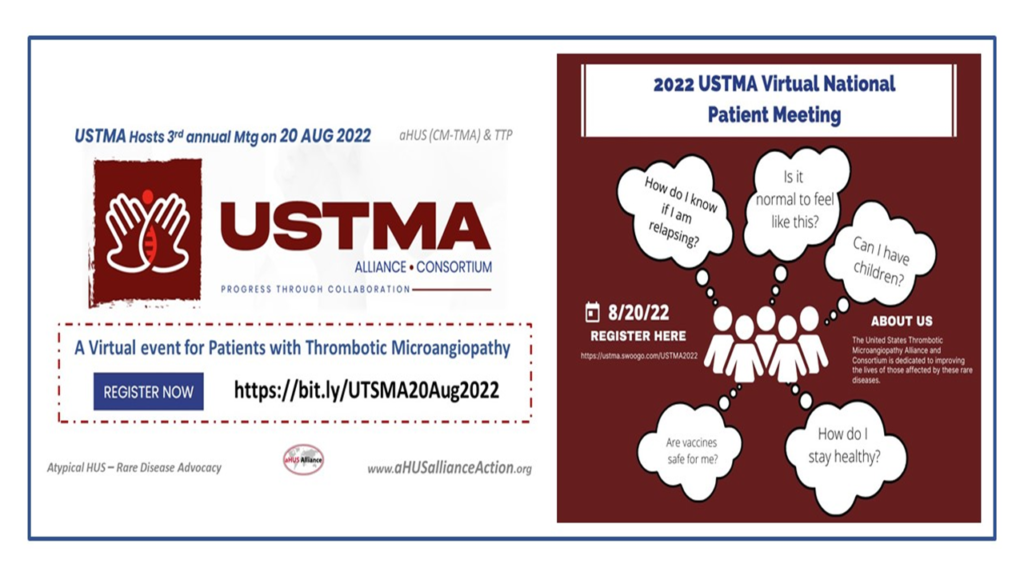
Atypical HUS patients, family caregivers, and aHUS advocates are invited to attend a full day virtual meeting which will be held on Saturday, August 20th, 9:00am to 4:30pm EDT. It will be a day of educational lectures, with the opportunity to ask questions and be involved with interactive breakout sessions designed for patients with aHUS and TTP (each involve thrombotic microangiopathy as a key feature of these conditions).
Hosted by the USTMA Consortium, this meeting is open to the global aHUS community, with more details at this link to the meeting’s agenda & registration page: https://bit.ly/UTSMA20Aug2022
Here’s how to register for this Saturday event, select the sessions you’d like to attend from the agenda offerings, and other more:
- BEGIN Registration with USTMA. Visit the USTMA registration page, where you’ll see a rough version of the day’s agenda. Provide your name & email along with your meeting status (participant) Be ready to select a Password.
- Receive a CONFIRMATION Email. Click the link provided to go to the Event page. You must ‘Join the Meeting’, as this brings you to Step 3.
- FINISH Registration for this 20 Aug 2022 event (on the Eventmobi.com platform), by selecting which sessions you wish to attend. It will note the time zone for your location. Several sessions are targeted for aHUS families – you’ll see a tag by those sessions.
Among the sessions offered are: ‘cm-TMA: updates in Treatment’, ‘Preventing Relapse’, ‘Ask the Doctor’, and ‘Womens’ Health & TMA) For the ‘Ask the Doctor’ sessions, patients and caregivers will submit the questions on the platform and they’ll be answered in real time. People are also welcome to email any questions ahead of time to Admin@ustmaconsortium.com
In addition to the Agenda, you can review tabs for Speakers, and more. (On the USTMA website, Sanofi and Alexion/AstraZeneca Rare Disease are noted as Platinum level sponsors for this event, with Gold sponsorship from Takeda ) Should you have questions, or difficulties signing up, email: Admin@ustmaconsortium.com
We’re pleased to note that USTMA has included within their agenda a portion titled ‘Patient Advocacy Initiatives’ from 3:10 to 3:45 pm EDT, and the aHUS Alliance Global Action team has been invited to offer a few comments at 3:30. This event will be hosted on EventMobi, which will allow participants to enter and leave as desired, and all sessions will be recorded for availability regarding future viewing.
What’s the USTMA Consortium, and who’s involved?
Founded in 2014, the United States Thrombotic Microangiopathy (USTMA) Consortium was established as a grassroots effort to organize research efforts in the thrombotic microangiopathies. USTMA co-founder Dr Spero Cataland has a deep background in research as well as diagnosis and treatment of both atypical HUS and TTP (thrombotic thrombocytopenic purpura).
The USTMA has grown to incorporate 15 centers which include clinical, academic, and research efforts at these locations (east of the Mississippi River): Cleveland Clinic, Ohio State University, Mayo Clinic, University of Minnesota, University of Oklahoma, Washington University, Duke University, East Carolina University, University of North Carolina at Chapel Hill, Wake Forest University, Medical University of South Carolina, Emory University, University of Rochester, Johns Hopkins University, University of Alabama at Birmingham, and Baptist Health South Florida.
From the USTMA website, about aHUS: “Another rare blood disorder that falls under the category of TMA (formerly named atypical hemolytic uremic syndrome (aHUS) is named: Complement-mediated HUS (CM-HUS). CM-HUS is a form of TMA that usually results from dysregulation of the alternative pathway of complement activation, resulting in the development of TMA findings and end organ injury of which renal injury predominates. CM-HUS can be triggered by infection, pregnancy and other causes of inflammation. Mutations of complement regulatory genes are found in more than half of patients with CM-HUS, but the presence of these mutations is not required for the diagnosis. Recent advances in the treatment of CM-HUS with an antibody that blocks complement activation have remarkably improved the prognosis of this disease.”
Why an aHUS Patient Meeting?
Atypical HUS patients not only battle an unpredictable and life-threatening disease that is medically complex, but a rare disease that affects all areas of their lives. Along with their families, people with aHUS face the impact of living with a rare disease and the social/economic challenges that come with it.
Information about atypical HUS can be difficult to find, in part because it affects only a handful of people per million but also because it’s classification is varied and information may be tagged with different key words such as: complement-mediated aHUS, familial aHUS, and genetic aHUS. Sometimes known as ‘typical HUS’, about 90% of hemolytic uremic syndrome cases are caused by infectious diseases (aka IA-HUS) such as e.Coli (STEC-HUS) but the remaining 10% of are classified as ‘atypical HUS’ which are primarily associated with mutations or autoantibodies (Jokiranta 2017). Confusion about classification and terminology has lead to a project by the National Kidney Foundation regarding a working group of aHUS experts to sort through and resolve aHUS information fragmented by nomenclature.
Why does aHUS Alliance Global Action support aHUS Patient Meetings?
The aHUS community needs and welcomes opportunities to engage with objective, informed clinicians and researchers, and patient meetings which provide updates and answers to our aHUS questions.
We welcome the opportunity to showcase information and events related to atypical HUS, in keeping with our mission to: Inform, Connect, Collaborate. We encourage early and global outreach to people and groups who create professional conferences, educational materials, and efforts regarding research or aHUS patient outreach.
An international group of volunteers who are aHUS patients and family caregivers, we may be reached at info@aHUSallianceAction.org

